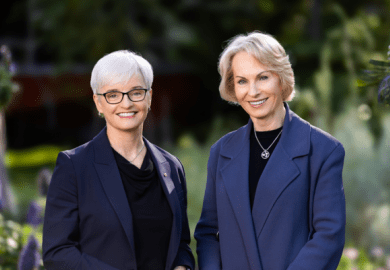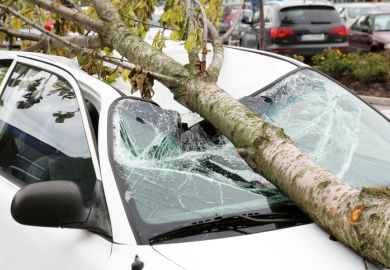Browse the full results of the World University Rankings 2025
Gender-based abuse has been among Australian universities’ thorniest issues of the past decade. The sector has endured several landmark reports and endless column inches about unacceptably high levels of sexual harassment and assault on campus – even though the available data suggests that the incidence at universities is little different from the rate in the community at large.
To Monash University vice-chancellor Sharon Pickering, that is no excuse. Rather than hiding behind broader community problems, she argues, universities should work to fix those broader community problems.
They can approach gender-based misconduct in two distinct ways, Pickering says. “One, the vast majority of our students are young people. That gives us an additional pastoral responsibility. Two, universities have an opportunity to be exemplar institutions within society. We can see that as a burden, or we can see it as a chance to show not only what universities are good at, but what we’re good for.”
Pickering should know. She has been studying gender-based violence for decades as part of a broader research focus on criminology, migration, border crossings and human trafficking – scholarship that netted her accolades including a 2012 Australian Human Rights Commission Award for media commentary, a 2013 Australian and New Zealand Society of Criminology prize for book of the year and a 2014 gong for best British Journal of Criminology article.
In recent years, her 20-year career at Monash has taken an increasingly administrative turn. As dean of arts from 2017, deputy vice-chancellor from 2021, acting provost from 2023 and vice-chancellor from January this year, she has been able to view gender-based violence through the lens of leader as well as academic expert.
“People underestimate how far we’ve come,” she says. “I would draw attention to examples of where we have understood how we can do prevention well, not just response. Prevention is absolutely critical. But this work will never be complete because society continues to evolve and change its expectations. We have to keep going, but we always need to go further and faster. We have not come far enough, and we have not come fast enough.”
She says young people arrive at university at a critical time in their lives. “Our opportunity is to shape them as future leaders and future citizens. The question around gender and sexually based violence is emblematic of that opportunity. We want to really work with them about how to create safe environments, and how to do that in a way that they can take out into the world. That’s the great opportunity.”

Pickering discerns a similar opportunity in the fraught area of migration, an issue that affects universities in the sharpest of ways. International students constitute about 29 per cent of the sector’s enrolments and provided it with 26 per cent of its operating revenue last year, including 33 per cent at Monash.
That revenue stream has come under increasing threat since last November, with the federal government unleashing no fewer than 10 policy interventions to curb international enrolments. They are part of a broader drive to reduce net migration amid community perceptions that Australia has admitted too many foreigners in the post-pandemic reopening of borders.
To Pickering, such an approach is predictable. “Talking as a criminologist, when you’re faced with complexity and trying to solve it in an enforcement sense, the easiest way to do it is through absolute measures. It’s simple, it’s straightforward and you can point to what you’ve done.
“That has an almost flattening effect. It may well get rid of some of the issues you’re dealing with, but it has a whole lot of unintended consequences. That’s the case with the measures around international students. There are certain parts of the argument that you can well understand. You want to deal with integrity issues; you want to deal with some issues around social licence. But you need to be able to do that without pulling at the threads of the whole system.”
She says the political reflex in Australia for at least the past 25 years has been to make migration a “one-dimensional” problem. “We haven’t been able to distinguish between permanent and temporary migration; migration for skills; migration for humanitarian purposes. We’ve just clumped it all together as a bunch of people that are somehow unmanageable.
“We have to get to a point where we can have mature, sophisticated conversations around migration and don’t just reach for the easiest lever. We have to be able to have those conversations across the political spectrum, where people aren’t being labelled as one thing or another and we think about it over the longer term, not linked to an electoral cycle. That’s our biggest challenge. And that’s why universities exist. We are the home of great long-term thinking.”
She acknowledges times in Australia’s deeper past when the political discourse around migrants was more positive: the “beautiful Balts” of the late 1940s, when attractive Estonians, Latvians and Lithuanians helped to spur public acceptance of post-war immigration, and the 1970s embrace of Vietnamese asylum seekers by a participant in the war that had torn their country apart.
“Those examples depended on the quality of the leadership of the time and an ability to tell a much richer story beyond a narrow economic band. It’s a social, a cultural, a geopolitical band. It’s about where we sit within the Indo Pacific. It’s about how we set ourselves up not for the next one, two or three years, but the next 10, 20, 30, 50-year span.
“One of the great frustrations for universities is when you come up against political systems that have a deep vested interest in electoral-cycle thinking, when we’re trying to think over a much longer time span for a much broader benefit.”
Pickering says that richer story has been ingrained in Monash’s DNA since its opening day in 1961 when, she says, one in 10 students – a huge proportion at the time – were foreigners bankrolled by the Colombo Plan. “Those students shaped Monash really quite profoundly,” she says. “They shaped our culture.
“You can’t talk about international students at Monash without talking about the 6,000-odd Australian students we send out across the Indo Pacific each year, as well as the 5,000-odd undergraduate students that we bring in. Through our Global Immersion Guarantee, every domestic student will get the opportunity to study in the Indo Pacific. They’ll be up close to industry and research. They’ll have an ethic of service.
“Being an international university is not a linear arrangement. I say that as a migration scholar. All good migrations are circular. They never start or stop; they only ever change. Seeing our students move in a range of directions – not just international students coming to us, but also our students going out – that’s a truly international education experience. It doesn’t matter whether you’re going to be a doctor or a lawyer or a teacher or in the arts or sciences. Understanding the world and developing those deep connections is going to extend your reach.”
Pickering also points to Monash’s campus in Kuala Lumpur, which celebrated its 25th birthday last year, and its younger sibling in Jakarta, which was “pulled out of the ground in the middle of Covid”. Both are “big, long-term commitments deep within the regulatory, social, cultural and economic systems of those countries”.
And both are strong tools of soft diplomacy – something not lost on Australian leaders. “When they visit our campuses across the region, my observation is that they find it quite overwhelming,” she says. “I think we’ve got a real opportunity to deepen that appreciation.”
Then there is the economic contribution of international students, to universities as well as their surrounding communities. Pickering says Monash is home to 25 per cent of the clinical trials in Australia, developing revolutionary drugs and medical devices for conditions including melanoma, lupus and uterine prolapse.
She says the best available treatments tend to come from clinician researchers trialling such therapies – something that is “deeply appreciated” across the broader community, particularly by patients and their families. The next step is to deepen understanding about how such work is financed.
“We can get into an argument around what should or shouldn’t be funded. The reality is that we’ve got the funding system we have because of the ways universities have been funded by successive governments over successive decades. But if you think about the kinds of things that have been funded by revenue earned through international education, they are remarkable things. They are things that will help push us beyond being a country of resource exploitation and selling houses to one another, to a country of innovation.”
While Pickering is no newcomer to Monash, she says the “line of sight” from the top is stunning. “I have never been prouder of this place.
“In this position, you get a 360-degree view. Being able to assemble those opportunities, think about priorities and how that sits not just for the next couple of years, but how we set this institution up for the next 15 to 20 – it’s pretty exciting.”
john.ross@timeshighereducation.com
This is part of our “Talking leadership” series with the people running the world’s top universities about how they solve common strategic issues and implement change. Follow the series here.
Register to continue
Why register?
- Registration is free and only takes a moment
- Once registered, you can read 3 articles a month
- Sign up for our newsletter
Subscribe
Or subscribe for unlimited access to:
- Unlimited access to news, views, insights & reviews
- Digital editions
- Digital access to THE’s university and college rankings analysis
Already registered or a current subscriber?








